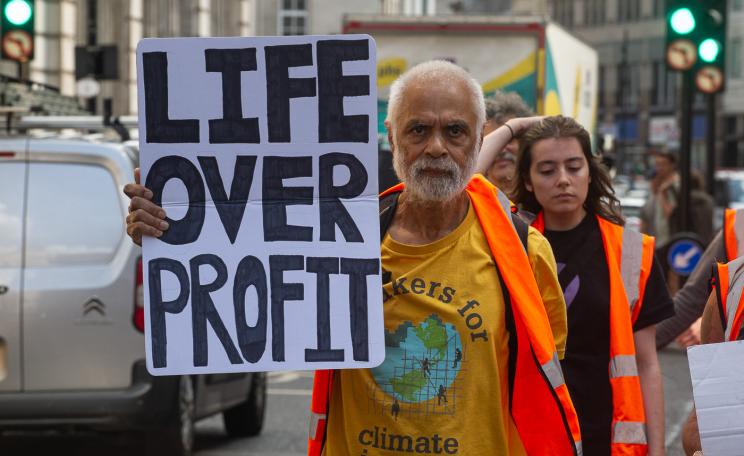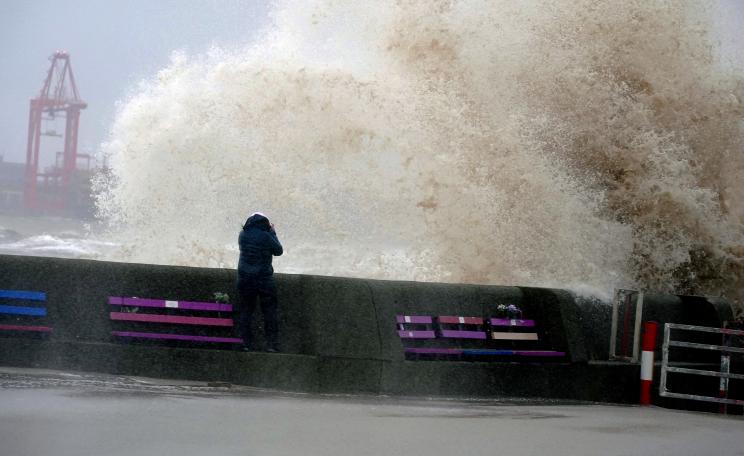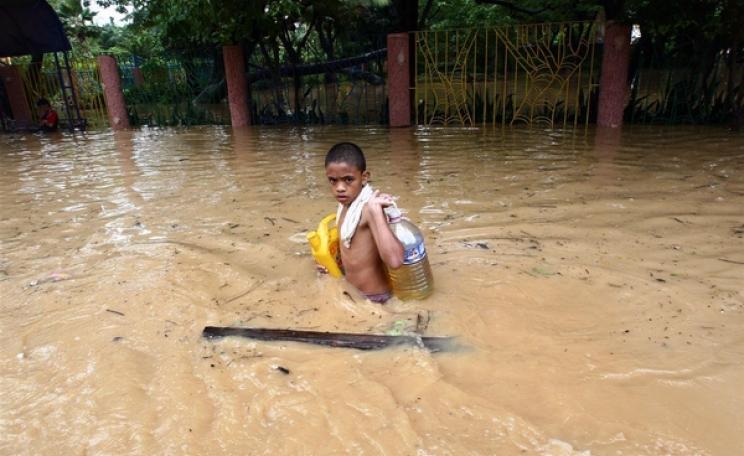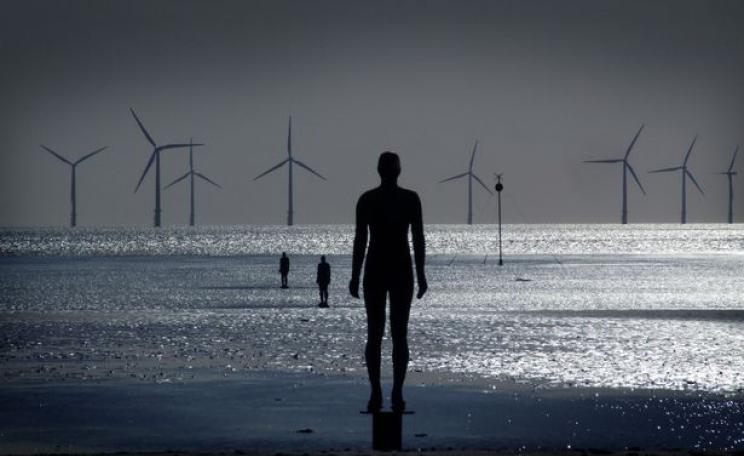Indigenous peoples are recognised as most at risk on the continent in terms of mental health issues related to climate change.
The world’s leading scientific body on climate change, the IPCC, has published its sixth annual review, referred to in the community as AR6. It was the first landmark IPCC publication to explicitly highlight mental health as a distinct climate-related concern.
A slew of articles lauded the news, and rightly so. However, if you dig into the granular detail of the 3,500+ page report there’s an alarming discrepancy.
The London School of Hygiene and Tropical Medicine is hosting a webinar on climate change and mental health – Keeping Our Planet in Mind – on Wednesday, 30 March 2022. More information can be found here.
Mental health issues exacerbated by climate change are disproportionately going to affect those living in the Global South, while a disproportionate amount of the research and attention paid to the connection between ecology and mind concentrates on richer countries.
Constellation
This article has been published through the Ecologist Writers' Fund. We ask readers for donations to pay some authors £200 for their work. Please make a donation now. You can learn more about the fund, and make an application, on our website.
This imbalance has stark implications for climate justice. If it’s not remedied, the people who will suffer the worst psychological ailments – driven to the edge of madness and beyond, by climate change – will have the least informed solutions available to them, underfunded support services and potentially a cascade of traumas lasting for generations.
It should be acknowledged that the introduction of mental health as a dimension in assessing climate impacts is a brilliant thing. It also takes a long time and meticulous work to explicitly add discrete research categories to IPCC publications.
This most recent report was a significant breakthrough, and a relief, especially given the scientific community’s reluctance to prioritise the psychological dimensions of the climate crisis to date. That’s not because public fears about the connection aren’t explicit. In fact, they are rapidly on the rise. Last year online searches for the term ‘climate anxiety’ increased by 565 percent, for instance.
Indigenous peoples are recognised as most at risk on the continent in terms of mental health issues related to climate change.
But as I’ve said before, explorations into the mental health impacts of climate change, including from institutions like the IPCC which effectively collate and present cutting-edge research, have been disappointingly tentative and broad-brush despite the devastating impact ecological breakdown is having on the minds of millions.
In the initial stage of my research for this piece I was mostly concerned that the publication wasn’t respecting the fact that ‘mental health’ as a category is actually a constellation of different psychological challenges, in the same way that ‘physical health’ encompasses conditions from respiratory problems and diabetes to heart disease and cancer.
Treatment
The IPCC breaks down physical health into multiple refracting problems, and there are collections of studies cited in AR6 that focus on each of them. But mental health is overwhelmingly treated as a homogenous category (with a few welcome but problematic exceptions – which I’ll come back to).
This doesn’t fit the lived experience of sufferers. It also ignores the fact that the DSM, the most widely used manual for diagnosing psychiatric illness, lists more than 150 conditions, or that one in seven adolescents worldwide have been diagnosed with a dizzying range of mental health issues, and that ‘mental disorders’ account for between 5% and 7% of all years lost to ill-health, disability or premature death.
Globally, depression is a leading cause of disability, the WHO recently named suicide as a leading cause of death internationally, and only 3% of countries are estimated to hit the worldwide Sustainable Development Goal target of reducing suicides by a third by 2030.
A stunning 14.3% of deaths worldwide are attributable to some kind of mental health issue. The urgent problem is that climate change is set to make all of this a lot worse.
Despite the simplistic and nebulous treatment of mental health in the report, the IPCC authors, a famously cautious panel of scientists, write with ‘very high confidence’ that the mental health of those in climate affected regions has already been damaged.
Inequalities
Specifically, the authors attribute this to trauma from extreme weather and loss of livelihoods and culture, forced migration, conflict, malnutrition, and anxiety and distress associated to past, present, and future climate impacts. Increased temperatures, in and of themselves, have been found to degrade mental health, reduce life satisfaction, happiness, cognitive performance and lead to higher levels of aggression.
One study, cited in the paper, even predicts a 6% rise in homicides globally for a rise in temperatures of 1oC. The panel predicts that the negative effect will be cumulative, as climate impacts increase in frequency and severity, leading to rising levels of stress, anxiety, depression, and an array of other conditions.
This is especially true for the very young, the elderly and those already experiencing psychological distress. An important study also finds that women are significantly more likely to suffer mental health impacts due to climate change.
But perhaps the starkest inequalities are geographical and socio-economic. The Global South is far more at risk than the Global North from climate-related mental health catastrophe. But the continent of Africa, for instance, which is the most likely to have some of the highest incoming mental health impacts, is the least studied region when it comes to these issues.
The IPCC report barely manages to ring any alarm bells about this and inequalities in attention between the Global South and Global North are evident in the report. This is largely due to a lack of sufficient existing research in areas most likely to be heavily afflicted by climate chaos, but there is little recognition of this.
Homicide
Over all, by my calculation, the continents that roughly constitute the Global North – as delineated by AR6 – are home to around 18% of the population. The Global South is home to 82% of humanity, according to a rough continent-by-continent division.
The report dedicates around 283 pages of the continent-specific chapters in the report to the Global North and 369 to the Global South. That means that the Global South, with 82% of the population, gets 57% of the coverage while the Global North, with 18% of the population, gets 43%. Something’s off here.
When you look explicitly at mental health things get more alarming. Combing through the references cited and the seemingly endless reams of information in the study, it’s hard to miss a dangerous discrepancy.
The IPCC trumpeted that this publication would be the beginning of taking the mental health aspects of climate change seriously, and I want to believe that.
But to take the continent of Africa as our example again, the dedicated chapter of 140 pages has just 12 lines related to mental health. A major chunk of this is spent discussing problematic racialised stereotyping such as allusions to “emotional control, aggression and violent behaviour, escalating rates of interpersonal violence, with homicide rising by as much as 18%...”.
Pathways
This is inadvertently reminiscent of outdated and persecutory anthropological discourses on race, disability and madness. The only other conditions mentioned explicitly are depression, anxiety and PTSD following extreme weather events. These are dealt with in a single sentence.
The Asia chapter alludes to mental health only two times. The chapter is 109 pages long. One allusion is a short paragraph that links high temperatures with mental disorders and increased suicide risk in several countries.
While it is undeniably heartening that there’s a level of detail, it should be noted that four of the five nations cited are amongst the wealthiest on the continent. The only other mention is buried in a dense list of impacts, passed over as what one can only assume is an afterthought.
In another chapter – on international health, wellbeing and communities – there’s an interesting paragraph related to pre-planning of shelters in China. This preparation apparently resulted in reduced anxiety, depression and PTSD of those impacted by flooding, but this potentially useful case fails to make an appearance in the Asia chapter proper.
The case is even worse for the 111 page chapter on Central and South America, in which mental health doesn’t get any mention at all. These chapters all have sections on health, and physical health impacts are specified along with some causal pathways and risk factors to identify. Comparatively, mental health doesn’t get a look in.
Displaced
The chapters on Europe, North America and Australasia are far more detailed. In Europe, there’s a precise distinction between different kinds of mental health issue.
Several cited papers from across Europe outline how PTSD, anxiety and depression follow flooding, as well as other extreme weather events, including an analysis of follow-up in the UK. Flooded residents were found to have had their trauma symptoms retriggered by having to deal with construction and insurance companies, compounding not only stress but what the authors term ‘identity loss.’
The authors also dive into discussion of adaptation methods, including funding shortages (unsurprisingly), better surveillance, analysis, early warning systems, training and stricter regulation of health policy.
The Australasian chapter links wildfires and mental health, and zeroes in on the 31,000 people displaced by a tropical cyclone in 2017, whose psychological conditions were notably damaged when their access to health and social care was undermined.
The North American chapter is replete with detail and citations. It’s the continent with the most resource to do this kind of research, so that shouldn’t be too much of a surprise.
Context-specific
The chapter even has a dedicated section for ‘mental health and wellness,’ which gets into the technical weeds delineating ‘cumulative,’ ‘vicarious,’ or ‘anticipatory’ events, categorical distinctions to bear in mind when analysing ‘disruptions to infrastructure, underlying determinants of health and changing place attachment,’ all of which are ‘stressors to mental health.’
Indigenous peoples are recognised as most at risk on the continent in terms of mental health issues related to climate change. Water security, loss of land and ecosystem support as well as the potential inability to practice traditional and cultural activities are compounded by historical traumas induced by land dispossession, marginalisation and a loss of human and non-human kin.
They also discuss a case study, where around 90,000 people had to evacuate due to a wildfire in Canada in 2016, following which residents’ mental health deteriorated. Another case study, this time of Hurricane Harvey, made an important distinction about racial disparities in mental health and recovery.
The authors continue to distinguish discrete conditions, going beyond what one might expect, to include things like ‘ecological grief and loss,’ ‘loss of cultural knowledge,’ and ‘domestic violence’ as important indicators related to mental health.
This should all be applauded, but what’s under the surface here is that the research is being done in academic institutions in the Global North, focusing on the Global North, most of which will be useful primarily to those in the Global North as mitigation and adaptation efforts – especially around something as idiosyncratic as mental health – are so context-specific.
Statistics
Cultural, socio-economic and political conditions, health infrastructure and the nature of climate impacts vary so widely and diversely between the Global South and North that unless copious amounts of research are done in the countries most at risk, and very soon, we could be facing a potentially hideous and widespread psychological crisis that will be difficult to follow and understand, let alone alleviate.
Currently only 0.5% of the funding allocated by UNFCCC climate finance projects is dedicated to health-related adaptation as a whole.
The IPCC states with characteristic detached objectivity that this is ‘insufficient’. We don’t even know what proportion of that is earmarked for mental health, specifically, let alone mental health in the Global South. Extrapolating from AR6’s apparent hierarchy of priorities, the prognosis here is dire.
AR6 does have a chapter solely dedicated to mental health and climate change. One might think that this is where the body of information on impacts in the Global South should be situated. Perhaps it’s all in there, and that’s why the other content is so sparsely related to this headline issue.
It does go into some detail, highlighting climate risks to several different mental health conditions and the pages are littered with terrifying statistics.
Anxiety
These include the fact that 20-30% of hurricane survivors develop depression and/or PTSD (and that it’s similar for flooding), a correlation between high heat and schizophrenia, mood disorders and neurotic disorders, as well as one paper claiming that a 1oC rise in temperatures can increase ‘mental health problems’ by 2% across the board.
Unsurprisingly, though, much of this is based on research in places like the US, Canada and Germany. While these places are important in terms of long-term trends, they are clearly less immediately at risk from direct climate impacts and the resulting mental health issues that those in the Global South will suffer.
The I in IPCC stands for Intergovernmental. It might as well stand for international. But on the face of it, when it comes to giving mental health impacts the level of granularity they deserve, it’s apparently reserved for the Global North.
Considerable space is given to Global North preoccupations with eco-anxiety. AR6 describes this as ‘anxiety about the potential risks of climate change and awareness of climate change in itself [affecting] mental health even in the absence of direct impacts’.
The section cites studies from the U.S., Europe and Australia. There was just one survey explicitly focused on a Global South nation, the Philippines, which found evidence that climate anxiety was damaging peoples’ mental health.
Burden
Even though they cited another important paper, a 25-country study of people’s mental health and feelings related to climate change, the IPCC authors failed to note that people in the Global South are already similarly assailed by negative thoughts about climate change leading to insomnia and poor mental health.
From media attention in the last year, eco-anxiety (or whatever we choose to call it) has been framed primarily as a Global North issue. Redressing this imbalance of attention is going to take time.
A summary table at the end of AR6’s chapter on health and wellbeing health impacts lists a dozen specific, discrete climate-related health outcomes worldwide.
11 of the 12 are physical, all of which are decidedly impacting the Global South the worst (Africa accounts for 92% of malaria deaths and Asia 96% of deaths from dengue fever, for instance).
They each appear to be well cited and the majority have already been and/or will be worsened by climate change with high or very high confidence. All except one, the final row - the ‘mental health’ category. The row has an asterisk. It’s an asterisk explaining why there are two empty boxes where information on disease burden and geographical distribution should be.
Disaster
The reason is ‘insufficient data’. There are several issues illuminated by this ostensibly harmless technical omission. One is that for some reason it’s been deemed appropriate to track, study and work on physical illness in the Global South to a sufficient degree for publications like the Global Burden of Disease (published in The Lancet) to confidently evaluate and compare international health inequalities.
The case is demonstrably not true for mental health, despite the fact that these issues in general, and suicide and depression in particular, disproportionately affect those living in low- and middle-income countries. In the Global South up to 90% of suffers go without treatment, according to the WHO.
Second, in this table, physical health has eleven subcategories, including malaria, diabetes and nutritional deficiencies, but mental health – a wide spectrum of disorders including anxiety and depression, but also schizophrenia, psychosis, PTSD, substance use disorders and eating disorders – gets one row, and a row that isn’t even filled with any data.
There is a pronounced qualitative and experiential dimension to mental health concerns, more than for most physical health conditions, that shouldn’t be steamrolled by oversimplifications of this kind. Failing to account for the importance of experiential as well as geographical idiosyncrasies will make diagnosis and treatment very difficult, if not impossible.
I read through many of the reports the AR6 cites, but one in particular resonated with me. It’s a 2020 study of the low-lying island nation of Tuvalu, a country often described as the “poster child for encroaching global disaster,” given its elevation of just 4.6m above sea-level.
Flawed
The report found that more than half of those interviewed said their levels of psychological distress related to climate change were ‘extreme.’ Almost 90% said this was hampering their daily functioning.
What was unusual about the responses, however, was that abstract climate change stressors – the very notion of climate change, rather than the physical impacts – appeared to be as important a contributor to psychological suffering as extreme weather itself.
Not only was climate change directly inducing mental health issues, but the mere expectation of future events is making these conditions worse. As one Tuvaluan put it “Sometimes I want to sleep, but I can't because those thoughts about climate change keep popping up.” Another said, “I hardly go out, because of those feelings.”
A 20-year-old woman echoed similar sentiments, bluntly: “I feel really scared hearing all this on the radio, about climate change. You never know if it comes true. Maybe we won't be prepared. We just sit there and wait to die.”
I don’t mean to doom-monger. Researchers around the world will hopefully take these important if flawed initial steps from the IPCC as a signal to the train their sights on climate related mental illness in ever increasing numbers.
Responsible
That’s exactly what we need. I spoke to one, Dr Elaine Flores, who is a Research Fellow in Planetary Health at the London School of Hygiene and Tropical Medicine, about the North-South discrepancy:
“It is clear, from the evidence we have,” she told me, “that the current and expected climate change effects are having an unfair major toll on the mental health and wellbeing of several population groups: it is a major health crisis. It will overwhelm our capacity to adapt and continue our lives, especially for a large majority of vulnerable groups in the Global South.”
I asked her what she had to say on the imbalance between the amount of research done on mental health in the Global North and South, and the AR6’s handling of it:
“The latest IPCC report has highlighted that the evidence and research we have on communities-led solutions that address this toll is scarce,” she said. “It’s not organised and still not being prioritised for those bearing the greatest impacts or having the largest vulnerabilities.
"The COVID-19 pandemic showed the highly different health outcomes that the same virus can have across countries. Climate change is already proving the unjust ways that it will continue impacting those who are least responsible for it.”
Dr Flores is researching the climate-mental health link in vulnerable communities and is part of a study looking at how best to ameliorate the situation. She is organising a webinar on the twin crises, hosted by LSHTM, called Keeping Our Planet in Mind, on Wednesday 30th March. More information can be found here.
Psychosocial
It takes a long time and a lot of academics doing a lot of work to add a new priority to the IPCC’s roster. The fact that AR6 included mental health at all, regardless of how unbalanced it is, is a major win. It’s necessary, but not sufficient.
The next step would be expanding the scope of investigations into the links between climate change and mental health into many different regions of the Global South, those most likely to be devastated in this particularly cruel way.
Mental health is intricately tied to environment and social context and, as one paper I read recently put it, “how mental illness is treated is intensely tied to where it is treated.” What is right for London, in terms of mitigation and adaptation to address psychiatric needs, is vastly different from what is needed in Dhaka.
There are rays of light here. The report mentions the usual recommendations for improved access to mental health services, spending more time in nature and monitoring the psychosocial impacts of extreme weather events, all sensible responses.
Again, this is necessary but not sufficient. But the authors also point to an existing trend, one they appear to be advocating, namely the increased use of wellbeing measures to assess climate impacts. Climate impacts are often measured in terms of economic cost.
Serious
This isn’t always the case, but trying to amalgamate all the human impacts – from property and infrastructure damage to livestock loss, forced migration, and death – into one calculation is deeply complex if not utterly implausible.
Focusing on wellbeing instead, modified by selected measures of human security, quality of life, self-reported happiness and living standards could be comparatively more focused, according to AR6, and an effective alternative route. This would lead to very different policy recommendations than just focusing on the economic value of lost assets.
This is deeply important, and highly relevant to a renewed focus on mental health and wider prioritisation of climate justice impacts. When lived experience is prioritised like this, poor households account for twice the losses from climate impacts compared to just using asset losses as the measure of climate impacts. A result that would be considerably fairer on multiple fronts, including in relation to mental health.
This could be this report’s most profound insight related to mental health - the need to put lived experience at the core of any investigations and our response. That would be revolutionary. There’s a deceptively simple yet pivotal symmetry to it, too. Humanity has caused climate change, a crisis derived from our separation from and domination of the natural world, and each other.
At the same time, the destabilisation of our ecosphere is destabilising the minds of large swathes of the human population. I write this as a sufferer myself. We have pushed not just the planet but our psyches to breaking point. Given that fact, now belatedly but thankfully entering public discourse, it’s only fair that we take a serious look. Right now, we’re not even doing that.
This Author
Charlie Hertzog Young is a researcher and writer working on climate, progressive politics, and mental health. He tweets at @CHertzogYoung. Read part one in his series: Diagnosing climate disorder. This article has been published through the Ecologist Writers' Fund. We ask readers for donations to pay some authors £200 for their work. Please make a donation now. You can learn more about the fund, and make an application, on our website.
The London School of Hygiene and Tropical Medicine is hosting a webinar on climate change and mental health – Keeping Our Planet in Mind – on Wednesday, 30 March 2022. More information can be found here.
If you are experiencing mental health distress you can reach out to the Samaritans or find out more information from the charity Mind.





